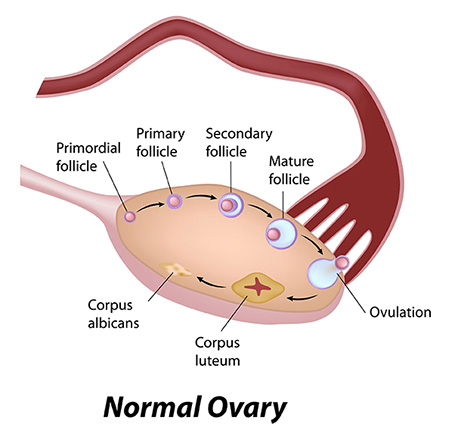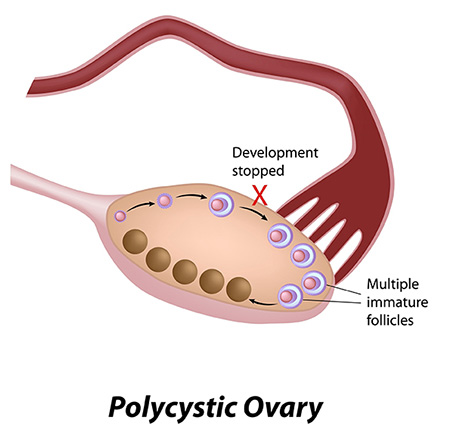Myofolic to increase fertility
Polycystic ovary syndrome (PCOS) refers to the most common hormonal disorders in women of reproductive age. Patients with PCOS have problems with ovulation, insulin resistance and abnormally high levels of androgens.
Polycystic ovary syndrome is called so because women with this condition usually have a number of cysts on the ovaries (generally twice the norm), no larger than 8 mm in diameter each). They are located far from the surface of the ovaries and contain follicles that have not developed properly due to a number of hormonal abnormalities. The egg cannot mature in such follicles. Subsequently, pregnancy occurrence is impossible. This pathology is successfully diagnosed with the use of screening during ultrasound scanning.


The process of ovulation involves the complex interaction of many different hormones. If one or more of these hormones are out of balance, there may be an irregular cycle or a rare ovulation, and the time needed to achieve pregnancy increases.
Menstrual disorders, hirsutism, acne and obesity may indicate the presence of polycystic ovary syndrome in women.
In adolescence, this condition can be manifested by the delayed onset of menstruation or irregular periods.
Women with PCOS might also have one or more additional symptoms, including:
- Fertility decrease – difficulty getting pregnant
- Irregular menstruation or absence of menstrual cycles
- An increased risk of developing diabetes or high blood pressure (pre-eclampsia) during pregnancy
- Irregular ovulation or absence of ovulation
- Weight problems – overweight, rapid weight gain, difficulty with the weight loss
- Skin problems, including oily skin, acne
- Unwanted hair growth on the face or body (hirsutism)
PCOS is the main cause of female infertility and is diagnosed in almost 10% of childbearing aged women. Although the cause of PCOS is not completely clear, hormone imbalances play a major role in the occurrence of the symptoms.
More male hormones, such as testosterone, are produced in the body of a woman with PCOS, which can affect ovulation and menstrual cycles. Many researchers believe that high testosterone levels are associated with decreased insulin sensitivity.
PCOS affects millions of women around the world and can manifest itself in different ways:
- is often a hereditary disease
- is one of the main causes of infertility in women
- if ignored, may lead to additional health problems in the future
- can affect the woman’s appearance and self-assessment
Some women have several mild symptoms, while others have a wider range of more severe symptoms. Symptoms usually begin during adolescence. Although in some women, the symptoms are not expressed until 20-25 years of age.
Causes of PCOS
The causes of PCOS are not clearly known, but it is believed they can be associated with sex hormone balance disorders and insulin resistance.

